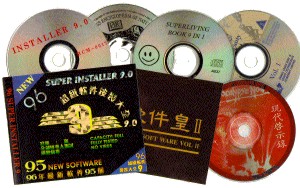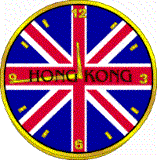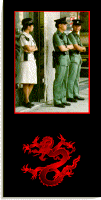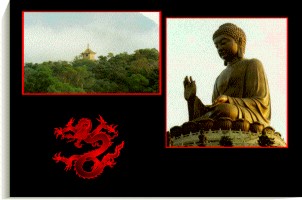
On our first full day in Hong Kong, we went to a place called Sham Shui Po where we had learned CD-ROMs were available for a portion of the price in the copyright-protected U.S. because these were pirated copies. Sure enough, upon entering a store I noticed that the CDs looked a little bit unusual. The paper inserts inside the cases were only colored copies of the originals. I noticed on particular CD-ROM which I already owned was selling for about a tenth of the price I had paid; prices in general were from HK$4-HK$80 (US$5.20-US$10.40) for CDs that would go for anywhere from $30-$300 and up in the U.S. I decided to purchase a couple and see how they worked because we knew a Hong Kong resident who had already purchased several CDs and said the pirated copies were usually flawless (I later found this to be the case with some exceptions). After I paid for a few CD-ROMs, I was told that I could not get the CDs immediately so I told the cashier that I wasn't about to leave the store without the product or my money even if I had a receipt. He explained in a quiet voice that the "jewel cases" in the store were empty because the CDs were copies and the police might raid the store at any minute. So I would have to wait ten minutes for the CDs to arrive. I agreed to wait and began wondering how I would explain to the police that I was knowingly participating in a crime, but wanted my money back if the CDs never showed up. After a short while another man came into the store with a small pouch which he opened up to hand to the cashier. It was four orders, including my own.

Before we left Hong Kong for China, we went back to Sham Shui Po where there was a larger group of stores that were open which hadn't been open at the time of our earlier visit. There were about a dozen stores that shared the space of a large basement of a building. Most of the vendors wee selling pirated CD ROMs though a couple were selling computer hardware instead. There was still a threat of a police raid in the air because none of the jewel cases had the CDs in them - you either received the CD after paying the cashier or were given a receipt and told to come back after a few minutes. The stores were doing a thriving business with Chinese customers and some foreigners as well. Most of the vendors had similar titles though some had a little better selection than others, some had more MPEG American movies or Chinese pornos (which cost anywhere from HK$150-HK$250 [US$19-32] depending upon whether or not they were MPEG videos or not). The competition between the vendors was minimal. I noticed one vendor who was selling CDs for HK$70 (US$9) that others were selling for HK$80 (US$10). Most if not all of the vendors were young Hong Kong Chinese in their late 'teens or early twenties, but I couldn't tell if this was indicative of a younger, cavalier attitude or if the people working at these stores were just protective covers for those who were really making the money off the pirated CDs. A few weeks later, this pirated CD mall was raided by police and closed, but this had happened before and it was expected that the stores would reopen before long.

Ironically, just as we were about to leave Hong Kong, I read a newspapers article about a private CD industry watch dog group. This international group's representatives just across the border in China had decided to cease activities in Guangzhou which consisted primarily of monitoring the manufacture of pirated copyright materials. This decision to pull out was made after numerous death threats to their personnel. Within a few weeks I read another newspaper article about the testimonial in a Deputy Trade Representative's report that China had made little progress in curtailing the activity of CD pirating in that country. Around this same time there had been reports that the U.S. was moving to allow China into the prestigious international trade forum, the World Trade Organization (WTO), but concerns over trade problems such as copyright piracy have pressured those in favor of letting China join the organization into waiting.

FOREIGN GRAFFITI IN HONG KONG:
"Get some water! I should think it's South America here."
[with an arrow pointing to the above remark]
"Are you kidding! You've probably never been to mainland China. You practically have to swim to get to the bathroom."


A woman employee at a guesthouse confided in us about how her elderly Chinese employers had changed since they decided they would leave Hong Kong just before it reverts to the mainland's control. They have stopped putting their money in the bank and instead put it in their separate rooms. The elderly lady is said to keep her special stash in a purse which she takes with her on trips across the narrow hallway to the toilet.

Of all Hong Kong residents, I couldn't help but feel sorry for the Royal Hong Kong Police. What will they do in 1997? How likely is it that the mainland government will allow the current police who has no allegiance to the mainland government or the way it likes business to be done to remain as it is? Even if the police personnel are allowed to keep their jobs, is it likely that they will continue to be paid the same under the mainland Chinese as they are under the British Administration? Not likely. Then I saw three policemen of some sort haranguing a street vendor at a ferry pier probably because he was selling food illegally. I was observing the scene when I heard a young female English voice from behind me exclaim: "It's an abuse of authority!" I turned around to see a young Chinese woman as she smiled, thinking that she had said it for my benefit. I hadn't formed an opinion about what I was seeing until she spoke up and made me reflect upon the enthusiasm a friend of mine has for unfettered commerce. He has often said that street vendors like the one I saw being harassed should be encouraged not discouraged because they are making an effort at survival so they are less of a drain on state resources, and are really no harm to anyone. I agree, it was an abuse of authority.

There is much discussion, and for good reason, about the success of overseas Chinese both in Southeast Asia and in America, but a visit to China and/or Hong Kong helps to provide some elucidation on this issue. In these countries the enormous population densely concentrated in urban areas or in impoverished countryside areas naturally produces severely aggressive behavior in the inhabitants. The will to persevere and strive for something better under then worst conditions can only flourish when given the opportunity in places like Hong Kong, Singapore, and the relatively docile region of Southeast Asia yet the culture that breeds this aggressive nature also breeds resentment in visitors to China, Hong Kong, and amongst the natives of Southeast Asia where this aggressiveness is seen as a threat as well as an annoyance.


